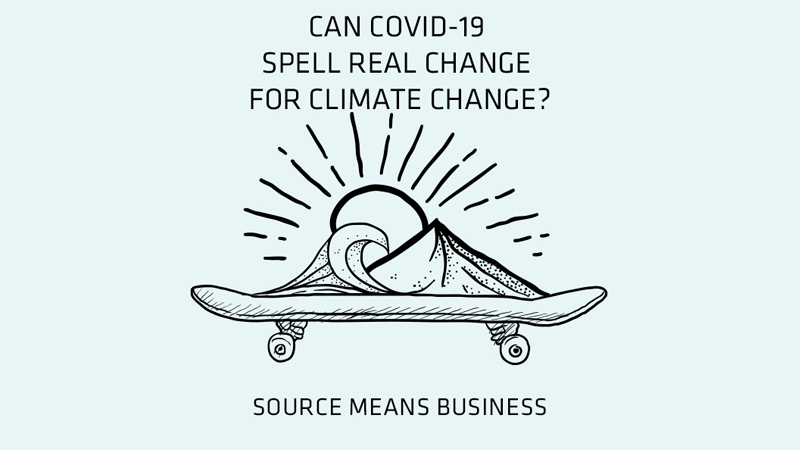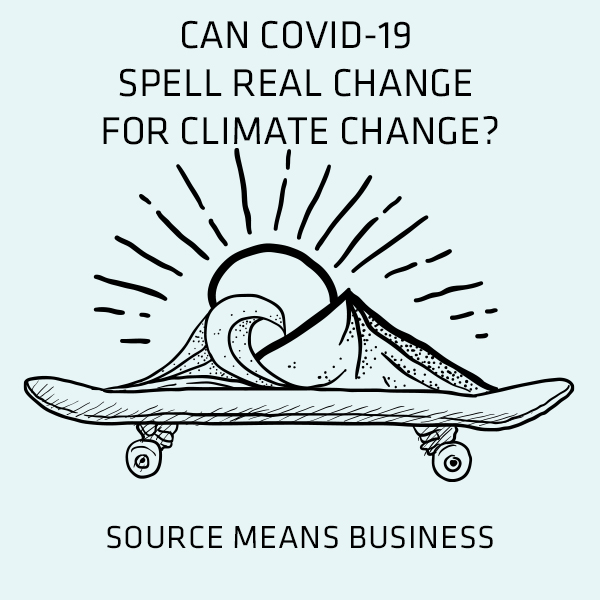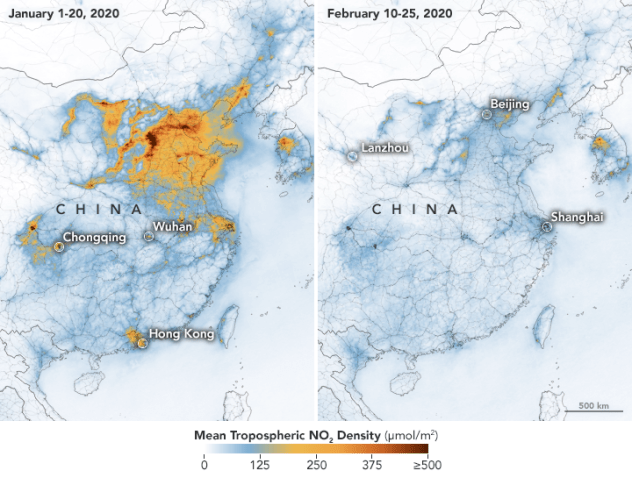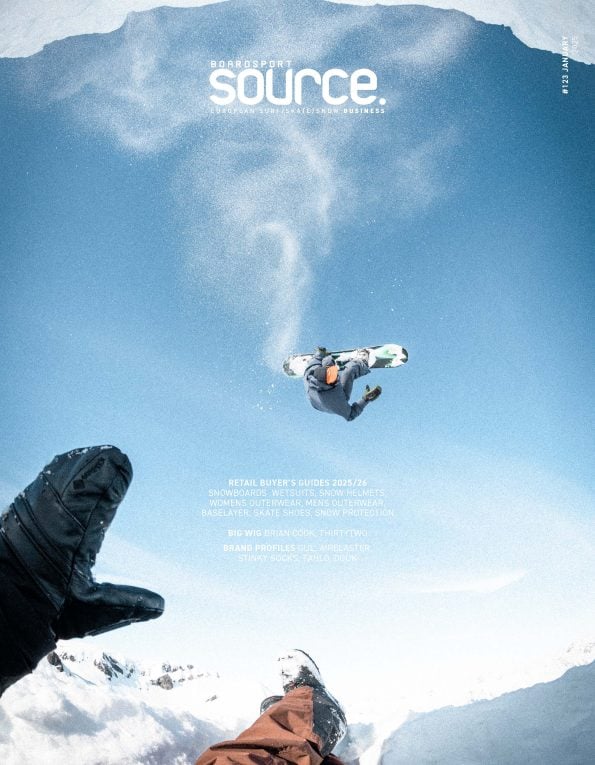
Can COVID-19 Spell Real Change For Climate Change?
Coronavirus is hitting every corner of the planet but as it presents difficult trading conditions for most businesses we’re on the search for positive perspectives to help our industry move forward.
Taking a sustainability approach, in today’s article Jonathan Weaver asks some important questions and relates them to our boardsports industry. What would happen if we responded as urgently to climate change as we have done to Coronavirus? Jonathan looks at the positive effect on China’s air quality over their shutdown period and wonders what the snowsports industry could do to alleviate environmental pressures facing our winters.
Article author Jonathan Weaver is a former British pro snowboarder who worked at Forum/Burton Snowboards for five years and has worked for Nike for 10 years including Nike SB, Nike Snowboarding and now serves as Global Brand Director: Womens By Nike.

I’m sure like many of you, the developments over the last weeks have seemed nothing short of surreal. What started as a news story on TV has quickly become something affecting friends in Europe, to now something which is hitting home with work being affected, day care and school closed and people being told to stay at home.
What it has done is shown how quickly the world can respond when it needs to. And I think that’s the difference here. The perception of need vs want. We see that we need to combat this virus so measures have been brought in by individuals (self isolation), whilst companies have brought in measures such as closing offices, stores and then governments have brought in hard borders, travel bans and fines for those going outside. The big shift here could be that we see what we as a human race is capable of if we work together and turn some of our desires and wants into needs.
What if we responded to climate change in the same way we are this virus?
We could see some huge shifts and ironically this virus could be the thing that teaches us this lesson. The threat of climate change is very real with some estimates predicting up to 250,000 people dying each year from climate change in the form of malnutrition, heat stress and malaria.
I just finished a course with Harvard Business School on Sustainable Business Strategy and they focused throughout the course on the role of companies, individuals and government in introducing sustainable business practices to help solve climate change. Throughout the course they challenged us to think:
“Can companies make a significant difference to climate change?”
It’s interesting because you think about companies like Patagonia who have led the charge against climate change, against Dams (as below) even filing a lawsuit against the President because of his reduction in the size of the national monument in Utah. They have the reach and the means to be able to campaign for change without the issues of borders stopping them. They can also create movements of people who will actively support the change.
In the Harvard Business School course another company highlighted was Lipton Tea who shifted to an entirely sustainable supply chain including helping local farmers develop regenerative farmer practices. They had to spend $1.2 billion to make that switch, which they didn’t benefit from fiscally for the first few years, but eventually it paid off with them now being seen as the market leader, not only from market share, but also from an innovation standpoint developing better relationships with farmers and a better quality product.
We were also taught to focus on breaking it down into easy-to-understand, bite sized chunks. I thought this commercial from PG Tips breaks it down pretty easily.
The beauty of companies like Patagonia, Lipton and Nike shifting their supply chains is that 157 of the top 200 entities in the world are corporations so don’t have the same borders as governments, so when they want to shift their practices, the affect across the world can be huge. Lipton have up to 70,000 suppliers within their supply chain so these shifts can really make a huge change.
The course also asked of us, “what role should governments play in tackling climate change?” and whilst companies can make a huge difference, to really enact change across all of humankind, governments need to do their part. When you asses the impact a government can have, bear in mind the percentage of pollution for the top 5 countries:
– China 30%
– United States 15%
– India 7%
– Russia 5%
– Japan 4%
If governments really wanted to tackle climate change, the same way and with the same speed they are tackling Coronavirus they wouldn’t be just surcharging for plastic bags there would be wholesale change especially with the worst offenders. If you’ve been to Japan you will know they individually wrap each piece of fruit in plastic before putting it on the shop floor.
The clue here could be to look at the impact of the quarantine restrictions set in place by the Chinese government on the air quality in China. “This is the first time I have seen such a dramatic drop-off over such a wide area for a specific event,” said Fei Liu, an air quality researcher at NASA’s Goddard Space Flight Center.

Sadly for the snowboard industry, ski resorts had to finish their winter season early. However it does make me wonder the effect that may have on the glaciers this summer. I’m personally guilty of having trudged up many a glacier in June, where each morning you have thousands of cars driving up a winding road to get to the top and take a picture of how sad it is to see the glacier melting away. It’s likely negligible in the short term, but imagine a concerted effort across multiple resorts for a few months a year. Yes it would impact the local economy in the short term but could that be part of what’s needed to help do our part for future generations?
To see the speed at which the governments have reacted I do wonder what a concerted effort against climate change could look like. For that to happen it does also require individual action. We need to realize that every action we have has its consequence. So to my last area and the role of the individual.
We recently did a body of work at Nike around waste and wanted to start close to home, the coffee cup. We estimated that with 75,000 employees, if each person has one cup of coffee every day in a disposable Starbucks cup that equates to 864 tonnes of trash going into landfill per year. Because you know Starbucks cups aren’t recyclable right? At least in the US they aren’t, they all go straight in the waste bin. We spread the word and eventually on campus they are now using reusable cups thankfully but you still see so many people with their single use coffee that they just had to get in the morning on the way to work.
We all have to realize the impact that our own actions can have upon the world, no matter how small.
So is there a silver lining to all of this? Well, I’m hopeful. I certainly hope it teaches us the power of working together, with each of us taking the role of leader. Be it in our country or in our home to bring about real change for continued improvement of issues that we should be seeing as needs rather than wants especially when it comes to climate change, for all of our sakes.




